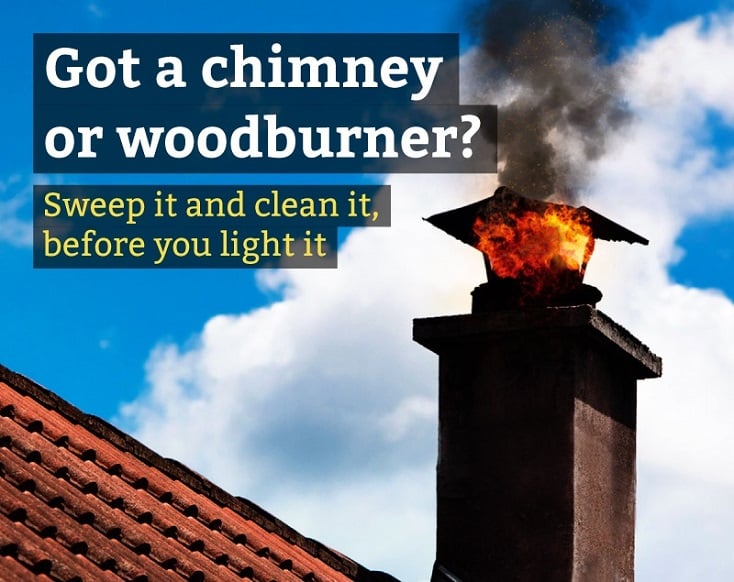Following a recent spate of chimney and woodburner fires in the area, Hereford & Worcester Fire and Rescue Service is reminding homeowners to get their chimneys swept by an approved sweep, if this is overdue.
Efficient sweeping prevents chimney damage, and, in worse cases, household fires.
In the past two months (December 2021 – January 2022) there have been 19 such fires, including ten fires last month – five in each county. This compares with the whole of 2021 when there were 99 such fires.
Last month’s chimney fires include incidents near Hereford and incidents in Worcester, Kidderminster, Droitwich and Evesham.
Over the most recent ten year period, between 1 April 2011 and 31 March 2021 in Herefordshire and Worcestershire, there were 1,524 chimney fires.
To get your chimney swept, you can find a local sweep easily via HETAS, the Heating Equipment Testing and Approvals Scheme, at Chimney Sweep Search | Find a Chimney Sweep Near Me (hetas.co.uk).
Emma Roberts, Hereford & Worcester Fire and Rescue Service’s Head of Prevention, said:
“Sweeping your chimney up to twice a year and using a quality assured fuel is the key to prevention. Not only does this remove soot and tar deposits, but also gives chimney sweeps the opportunity to check for any problems with the chimney or liner.
“A typical sweep only takes about 90 minutes and doesn’t make a mess. Professional chimney sweeps use modern methods and tools such as power-sweeping, CCTV and vacuums to ensure minimal disturbance for the homeowner. Customers don’t need to move all of their furniture out of the room.
“So if your chimney is overdue for a sweep, now is the time to get it done and not add to the list of chimney fires.”
HWFRS recommend these top tips to keep you and your family safe from chimney fires:
- Have your chimney swept regularly by a Certified Sweep, depending on what fuel you burn.
- Keep chimneys, flues and appliances clean and well maintained
- Chimneys that have been lined still require regular sweeping
- Never interrupt the air supply by blocking air vents or air bricks
- Avoid ‘slumbering’ an appliance – unless it has been tested as safe to do so. (‘Slumber mode’ is setting an appliance is at a low or minimum output normally for overnight burning, to be revived next day without having to relight it.)
- Be careful when using open fires to keep warm. Make sure you always use a fire guard to protect against flying sparks from hot embers
- Ensure the fire is extinguished before going to bed or leaving the house
- A fire plan can also ensure your family escape in a fire
- Have at least one smoke alarm on every level of your home and test them weekly
- Don’t keep this advice to yourself – pass it on. Is there anyone you can help to organise a sweep or test their alarms?
How often should chimneys be swept?
- Smokeless Fuels – at least once a year
- Wood – quarterly when in use
- Oil – once a year
- Gas – once a year (refer to Gas Safe Register)
Emma Roberts added: “People wouldn’t think twice about getting their cars MOT’d, but chimneys often get overlooked. Why not get the job done today if it is overdue?
“Don’t forget, HWFRS Prevention Technicians and Fire crews are delighted to visit local residents and carry out a FREE Home Fire Safety visit if they qualify, to help keep them safe in their homes.
“Just contact us on 0800 032 1155 to see if you qualify for a free Home Fire Safety visit or would like fire safety advice?
For more information on maintaining your chimney and how can help with fire prevention, please see last year’s chimney fire safety guidance at: www.chimneyfiresafetyweek.co.uk.
